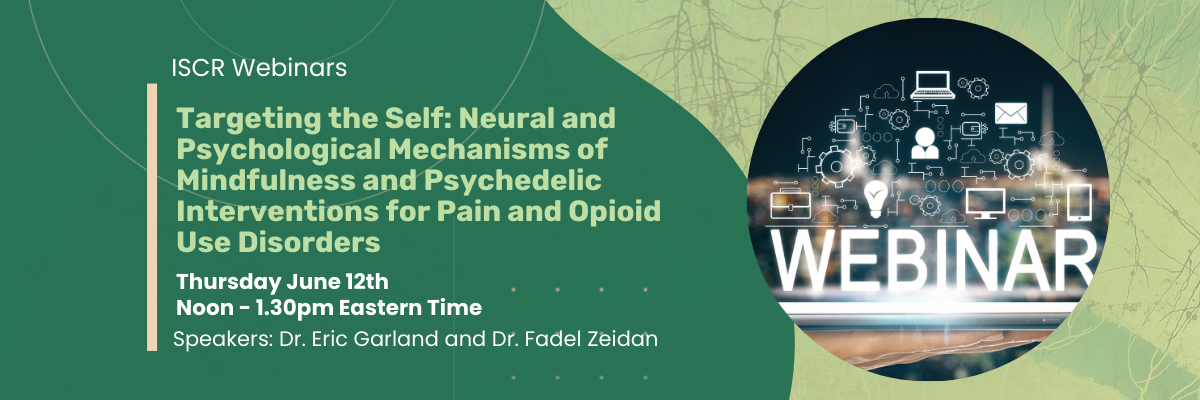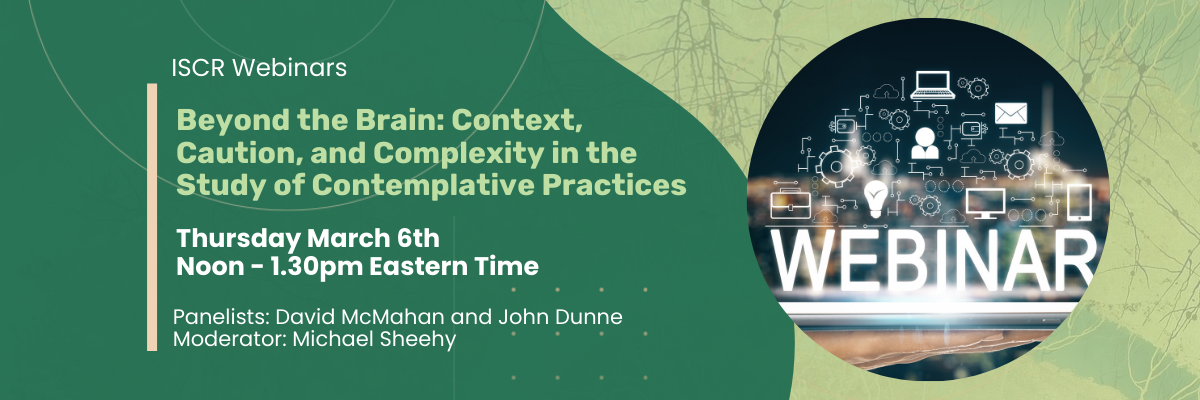Webinars
Overview
The International Society for Contemplative Research is pleased to announce a series of webinars to review the present state of the field, address key issues critical to further progress, and promote the education and participation of young researchers
Webinars are free for ISCR Members!
Webinar Calendar
Further webinar information coming soon
Previous Webinars

Mind-Body therapies, Resilience and Brain Health in Aging
In this presentation, Dr Lavretsky reviewed the effect of mind-body therapies with a focus on Yoga and Tai Ch on psychological resilience, brain health and whole person health in aging adults.
Helen Lavretsky, MD, MS is a Professor In-Residence in the Department of Psychiatry at UCLA and an integrative geriatric psychiatrist with federally funded research program in integrative mental health investigating mind-body interventions (yoga, meditation, Tai Chi, Qi Gong). Her current research studies include investigations of novel therapeutic options for caregiver stress, mood, and cognitive disorders in older adults, and Long-COVID. She is the Distinguished Fellow of the American Psychiatric Association, the American Association for Geriatric Psychiatry, and the Fellow of the American College of Neuropsychopharmacology and the American College of Psychiatrists, and the recipient of the Distinguished Investigator awards for research from the American College of Psychiatrists and the American Association for Geriatric Psychiatry, and the American Psychiatric Association. She is the Director of Research for the UCLA Integrative Medicine Collaborative and the Integrative Psychiatry program. She is the immediate Past President of the American Association for Geriatric Psychiatry, and is one of the leaders of the American Brain Health Coalition, and serves on the Research Advisory Boards to the National Center for Complementary and Integrative Health and the American Heart Association, among others.

Targeting the Self: Neural and Psychological Mechanisms of Mindfulness and Psychedelic Interventions for Pain and Opiod User Disorders (click to read more)
Chronic pain and opioid misuse remain among the most pressing public health challenges of our time, requiring innovative, evidence-based interventions grounded in translational neuroscience. This ISCR webinar brings together two leading researchers whose work examines the neural and physiological mechanisms underlying contemplative and psychedelic-based approaches to pain modulation and addiction treatment. Dr. Eric Garland will present findings from multiple randomized clinical trials examining Mindfulness-Oriented Recovery Enhancement (MORE)—alone and in combination with ketamine—to address chronic pain, opioid misuse, and opioid use disorder (OUD). Dr. Garland will describe how MORE engages neurophysiological mechanisms to regulate and restructure reward processing and the sense of self, offering novel treatment targets for addiction recovery rooted in contemplative science. Dr. Fadel Zeidan will share new findings identifying endogenous and neural mechanisms supporting the direct modulation of evoked chronic low back pain by mindfulness meditation as compared to a sham-mindfulness meditation intervention. Dr. Zeidan will also present new findings from the first randomized pilot clinical trial assessing the effects and neural mechanisms by psilocybin as compared to placebo in patients living with treatment resistant phantom limb pain.
This webinar will be of particular interest to clinicians, neuroscientists, mental health professionals, and contemplative researchers focused on non-pharmacological and neurophenomenological approaches to pain and addiction. Join us in discussion to explore emerging, mechanism-driven interventions—rooted in mindfulness and psychedelic science—that are reshaping how we understand and treat pain and addiction through self-regulatory and neuroplastic processes.

Beyond the Brain: Context, Caution, and Complexity in the Study of Contemplative Practices (click to read more)
Contemplative practices have inspired profound scientific inquiry into the mechanisms of the mind, but understanding them fully requires more than just translation or analysis of Buddhist texts.
This webinar brings together critical humanistic insights into the use of Buddhist texts and cultural contexts in contemplative science. The webinar will explore the pitfalls of relying too heavily on traditional texts, uncover the hidden assumptions within Buddhist terminology, and discuss the limitations of purely neurobiological models of meditation.
By integrating perspectives on textual caution and cultural context, this session aims to provide researchers and scholars interested in contemplative research with tools to navigate the complexity of contemplative traditions while preserving their depth and transformative potential.

Mindfulness-Based Interventions and Clinical Applications: Methods and Mechanisms (click to read more)
If you have any ideas or suggestions for a future ISCR webinar please contact:
Derek Jardine derek@podiumconferences.com
